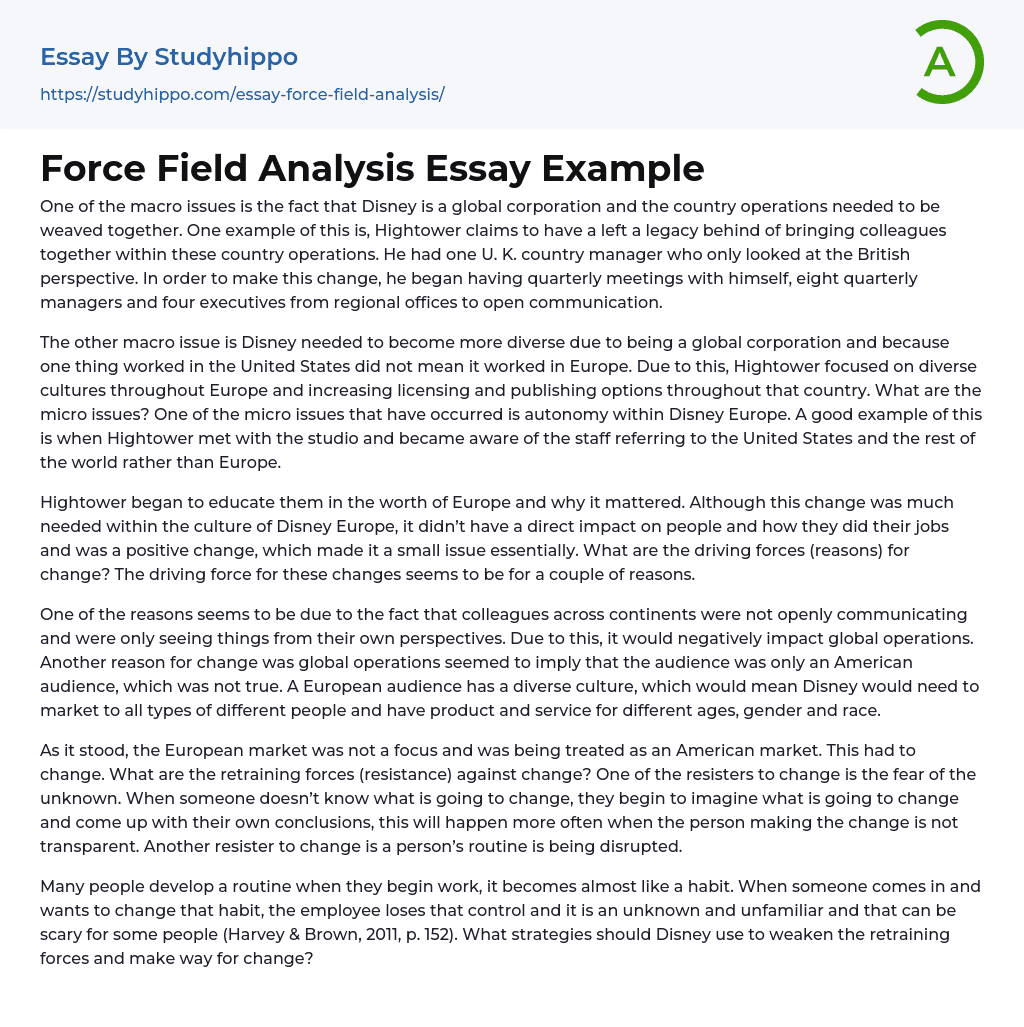One of the macro issues is the fact that Disney is a global corporation and the country operations needed to be weaved together. One example of this is, Hightower claims to have a left a legacy behind of bringing colleagues together within these country operations. He had one U. K. country manager who only looked at the British perspective. In order to make this change, he began having quarterly meetings with himself, eight quarterly managers and four executives from regional offices to open communication.
The other macro issue is Disney needed to become more diverse due to being a global corporation and because one thing worked in the United States did not mean it worked in Europe. Due to this, Hightower focused on diverse cultures throughout Europe and increasing licens
...ing and publishing options throughout that country. What are the micro issues? One of the micro issues that have occurred is autonomy within Disney Europe. A good example of this is when Hightower met with the studio and became aware of the staff referring to the United States and the rest of the world rather than Europe.
Hightower began to educate them in the worth of Europe and why it mattered. Although this change was much needed within the culture of Disney Europe, it didn’t have a direct impact on people and how they did their jobs and was a positive change, which made it a small issue essentially. What are the driving forces (reasons) for change? The driving force for these changes seems to be for a couple of reasons.
One of the reasons seems to be due to the
fact that colleagues across continents were not openly communicating and were only seeing things from their own perspectives. Due to this, it would negatively impact global operations. Another reason for change was global operations seemed to imply that the audience was only an American audience, which was not true. A European audience has a diverse culture, which would mean Disney would need to market to all types of different people and have product and service for different ages, gender and race.
As it stood, the European market was not a focus and was being treated as an American market. This had to change. What are the retraining forces (resistance) against change? One of the resisters to change is the fear of the unknown. When someone doesn’t know what is going to change, they begin to imagine what is going to change and come up with their own conclusions, this will happen more often when the person making the change is not transparent. Another resister to change is a person’s routine is being disrupted.
Many people develop a routine when they begin work, it becomes almost like a habit. When someone comes in and wants to change that habit, the employee loses that control and it is an unknown and unfamiliar and that can be scary for some people (Harvey & Brown, 2011, p. 152). What strategies should Disney use to weaken the retraining forces and make way for change? The first thing Disney should do is develop standard language that will be released to all employees that change will be taking place, and why it is taking place.
Transparency is key in this
type of situation. If Disney is not transparent, employees will begin to make their own determinations of what will happen and rumors will abound. The second thing Disney should do is determine what changes are needed and will take place and develop a method for how they will make these changes. I would suggest developing a timeline with phases to incorporate into the corporations and release this to the staff so they have an idea of what is going to take place and allow questions to managers.
If they allow this, managers should be coached on how to talk to their staff about this change in addition to the Human Resources staff. The third thing Disney should do is ensure they have an adequate adjustment period time set up for the changes to take place in addition to an evaluation period to ensure they made the right changes. If not, they will need to see why the changes are not working and make adjustments. They should also make sure they survey staff and allow for feedback.
- Berlin essays
- Pompeii essays
- Paris essays
- Athens essays
- Belgium essays
- England essays
- Germany essays
- Greece essays
- Ireland essays
- Italy essays
- London essays
- Russia essays
- Spain essays
- United Kingdom essays
- Great britain essays
- Rome essays
- British essays
- Birmingham essays
- Afghanistan essays
- Africa essays
- America essays
- Asia essays
- Australia essays
- Caribbean essays
- City essays
- Developing Country essays
- Dubai essays
- Earthquake essays
- Europe essays
- Fracking essays
- Georgia essays
- Middle East essays
- Natural Disaster essays
- New Zealand essays
- North Korea essays
- South Korea essays
- Thailand essays
- Travel essays
- Field essays
- Abnormal Psychology essays
- Abraham Maslow essays
- Attachment Theory essays
- Authority essays
- Behaviorism essays
- Classical Conditioning essays
- Cognitive Psychology essays
- Counseling essays
- Developmental Psychology essays
- Educational Psychology essays
- Erik Erikson essays




